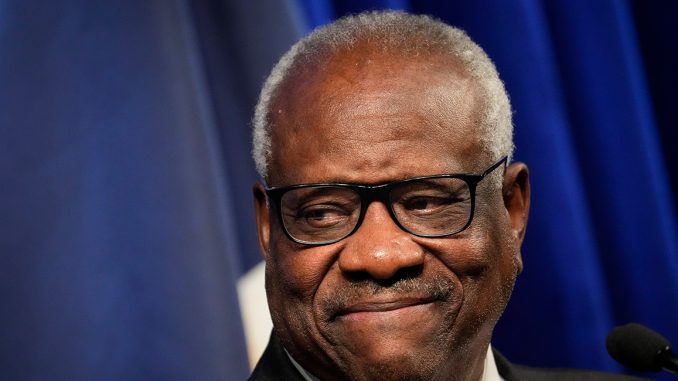
There is no worse example of a biased, tendentious mainstream media with ulterior motives than the castigation of Supreme Court Justice Clarence Thomas during the past half year.
The latest example stems from flyspecking Thomas’ amended financial disclosure reports, repeating what has never been disputed and attempting to cast a dark shadow on otherwise innocent, normal conduct—that the man has affluent friends and these friends engage in activities with their friends, which is typical of those with wealth.
Apart from the shameless and intentional misinterpretation of this reality, what is omitted from the reporting truly speaks volumes. There are neither accusations nor even circumstantial evidence that the 700-plus opinions Thomas has written over his career, the 2,800-plus cases he has voted on, and the millions of words he has authored have been compromised in any way to benefit his friends. Even the “bombshell” article by ProPublica, which detailed Thomas’ relationship with his friend Harlan Crow, conceded that “Crow and his firm have not had a case before the Supreme Court since Thomas joined it.”
Throughout his tenure, neither the media nor any litigant appearing before Thomas has alleged that he shortchanged justice in any case for hidden motives. Yet, this ProPublica article and its subsequent echoes desperately attempt to construe a narrative that mere friendship with an affluent individual, and receiving treatment no different from that given to other friends, somehow signifies that Thomas harbors ulterior motives.
The arguments presented vacillate between being feeble and outright juvenile. The cornerstone ProPublica piece, for example, musters the claim that “the details of [Crow’s] discussions with Thomas over the years remain unknown, and it is unclear if Crow has had any influence on the justice’s views.” In essence, the exposé—heralded as a revelation of Thomas’ alleged indiscretions—ended not with a bang but a whimper.
If the mainstream media endorsed Thomas’ opinions, any whining over his financial disclosures would be muted or inaudible. When liberal Justice Ruth Bader Ginsburg publicly and injudiciously assailed Donald Trump’s candidacy in 2016, describing him as “a faker” and criticizing both his “ego” and his decision not to release his tax returns (comments for which she later apologized), most in the media winced for a few seconds but moved on.
Ginsburg remained in its judicial Valhalla, without an adverse footnote, even though she didn’t recuse herself from numerous cases involving the Trump administration that subsequently came before the court. And when Justice Sonia Sotomayor failed to recuse herself from a case in which her book publisher was before the court, there was nary a peep from the media.
The obvious problems that could arise from these two instances warranted far more concern from media watchdogs than Thomas’ case. After all, why should liberal justices be held to a less exacting standard than he? All the justices take the same oath to support and defend the Constitution; all should be role models for the nation’s youth. Indeed, when the liberal bloc of the court held sway, Ginsburg and Sotomayor were far more influential than Thomas, who was regularly relegated to writing pointed, devastating dissents that, unfortunately, had no precedential weight.
Of course, Thomas is not above criticism. His judicial handiwork is fair game, as is that of every other justice; you can question his reasoning or his adherence to precedents. As former president and, later, Chief Justice William Howard Taft instructed,
Nothing tends more to render judges careful in their decisions and anxiously solicitous to do exact justice than the consciousness that every act of theirs is to be subject to the intelligent scrutiny of their fellow men, and to their candid criticism. … In the case of judges having a life tenure, indeed, their very independence makes the right freely to comment on their decisions of greater importance, because it is the only practical and available instrument in the hands of a free people to keep such judges alive to the reasonable demands of those they serve.
Journalists, of course, should be evenhanded in their analysis and critiquing of the opinions of all the justices. Thomas should not be singled out for special treatment, nor should any ideological bloc of justices be. Journalists should report and analyze fairly, no matter which justices’ opinions or actions they are analyzing. Supreme Court reporters, in particular, should be trained in law to distinguish between the Constitution and partisan politics; they should avoid turning fleas into elephants or shrinking elephants into fleas.
The Supreme Court bears the profound responsibility of interpreting a document penned more than 250 years ago by the most visionary minds of their era. Justice Thomas, having personally endured the deep scars of racism stemming from misinterpretations of this very text, embodies the gravity and significance of this responsibility.
COPYRIGHT 2023 CREATORS.COM
The Daily Signal publishes a variety of perspectives. Nothing written here is to be construed as representing the views of The Heritage Foundation.
Have an opinion about this article? To sound off, please email letters@DailySignal.com, and we’ll consider publishing your edited remarks in our regular “We Hear You” feature. Remember to include the URL or headline of the article plus your name and town and/or state.

Be the first to comment